
Paul Revere & the Raiders were an American rock band formed in Boise, Idaho, in 1958. They saw considerable U.S. mainstream success in the second half of the 1960s and early 1970s. The band was known for including Revolutionary War-style clothes in their attire.

"I'll Be Doggone" is a 1965 song recorded by American soul singer Marvin Gaye and released on the Tamla label. The song talks about how a man tells his woman that he'll be "doggone" about simple things but if she did him wrong that he'd be "long gone". The song was written by Miracles members Smokey Robinson, Pete Moore and Marv Tarplin, initially for The Temptations, who rejected the song.
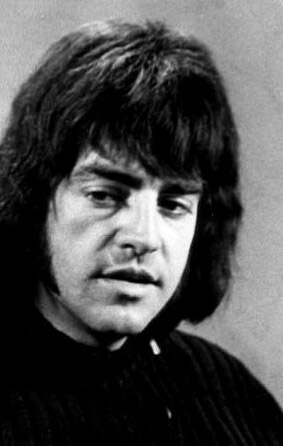
Mark Lindsay is an American musician, best known as the lead singer of the rock band Paul Revere & the Raiders.

"Indian Reservation (The Lament of the Cherokee Reservation Indian)" is a song written by John D. Loudermilk. It was first recorded by Marvin Rainwater in 1959 and released on MGM as "The Pale Faced Indian", but that release went unnoticed. The first hit version was a 1968 recording by Don Fardon – a former member of the Sorrows – that reached number 20 on the Hot 100 in 1968 and number 3 on the UK Singles Chart in 1970.

"Don't Pull Your Love" is the debut single by Hamilton, Joe Frank & Reynolds which became a top ten hit single in 1971. The song was written by Brian Potter and Dennis Lambert.

New Colony Six is an American garage and later soft rock band from Chicago, formed in 1964. Original members were Ray Graffia Jr. (vocals), who was born March 28, 1946; Chic James (drums); Pat McBride (harmonica); Craig Kemp (organ); Wally Kemp (bass); and Gerry Van Kollenburg (guitar), who was born June 26, 1946. Ronnie Rice replaced Craig Kemp in 1966. There were numerous changes in the lineup over the years. Richie Unterberger characterized the group's sound as "a poppier American Them with their prominent organ, wobbly Lesley-fied guitar amplifications, and rave-up tempos", later devolving into "a cabaret-ish band with minor national hits to their credit by the end of the 1960s." Like Paul Revere & the Raiders - with whom NC6 shared a two-flat before either band hit the charts or knew that the other had nearly identical stage wear, they wore colonial outfits on stage.

Wilton Frederick "Freddy" Weller is an American rock and roll and country music and artist. He recorded for Columbia Records between 1969 and 1980. He had his highest charted single in 1969 with his debut release, "Games People Play".
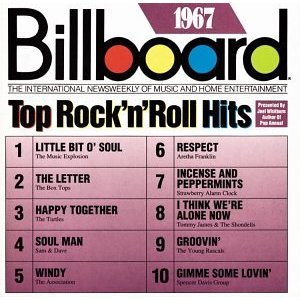
Billboard Top Rock'n'Roll Hits: 1967 is a compilation album released by Rhino Records in 1989, featuring 10 hit recordings from 1967.
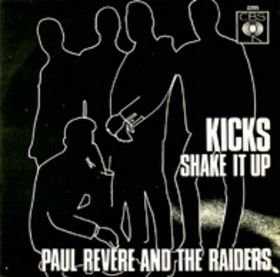
"Kicks" is a song composed by Barry Mann and Cynthia Weil, best known as a 1966 hit for American rock band Paul Revere & the Raiders.
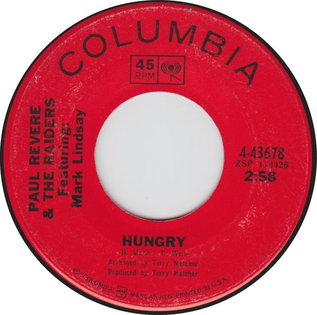
"Hungry" is a 1966 hit single composed by the songwriting team of Barry Mann and Cynthia Weil, and performed by Paul Revere & the Raiders.

"I Know (You Don't Love Me No More)" is an R&B song written and recorded by American singer Barbara George, released as her debut single in 1961. It became her signature song and her only major hit in United States, reaching No.1 on the Billboard R&B singles chart and No.3 in the Hot 100. It was later covered by various artists, inducing Fats Domino, Cher, Ike & Tina Turner, and Bonnie Raitt. A Spanish version by Marisela topped Billboard's Latin chart in 1988. The Shirelles borrowed the melody of "I Know" for their 1963 cover of "Everybody Loves A Lover".

Paul Revere & the Raiders are an American rock band from Boise, Idaho. Formed in 1958, the band released their first hit single three years later, "Like, Long Hair", which reached number 38 on the U.S. Billboard Hot 100 chart. Following a few minor charting singles, including a version of "Louie Louie", the band worked with producer Terry Melcher in updating their sound, combining fast-paced, guitar-and-vocal-dominated rock and roll with an intimidating R&B flavor. The result was a string of commercially successful singles, beginning with 1965's "Steppin' Out" and continuing with "Just Like Me", which reached number 11 on the Hot 100, as well as "Kicks", "Hungry", and "Good Thing", all of which peaked inside the top 10. In addition, the band's three 1966 studio albums—Just Like Us!, Midnight Ride, and The Spirit of '67—were each certified gold in the United States.

"And the Grass Won't Pay No Mind" is a song written by Neil Diamond and recorded in 1969 on his Brother Love's Travelling Salvation Show LP. It was also featured on his live LP Hot August Night. Diamond's original became a minor hit in Australia before the song became a U.S. and Canadian hit for Mark Lindsay in the fall of 1970.
"Asia Minor" is a 1961 instrumental recording by Jimmy Wisner. It is a rock and roll adaptation of Edvard Grieg's "Piano Concerto in A Minor", using shellac on the hammers of a cheap piano so as to induce a honky-tonk sound. He was turned down by 10 labels and had to release the track on his own label Future Records. The song became a hit, reaching No. 8 on the Billboard Hot 100 and No. 35 on the UK Singles Chart, despite having been banned by the BBC, which at the time refused airplay for music found to violate various standards, including pieces deemed to "[distort] melody, harmony and rhythm".

Alias Pink Puzz is the eleventh studio album by Paul Revere and the Raiders.

The Guilloteens were an American garage rock band formed in Memphis, Tennessee in 1964. Much of the band's musical stance was distinguished for incorporating their homegrown Memphis influences with a hard-edged sound. Among the group's singles, the Guilloteens are most-known for their regional hit "I Don't Believe" and "Hey You". Although national success eluded the group, they are now considered one of the more accomplished garage rock acts to emerge from the era.
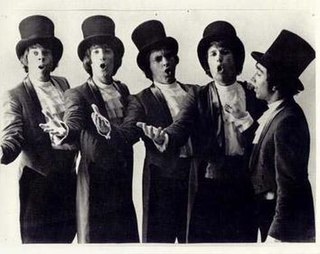
Don and the Goodtimes were an American garage rock band, formed in Portland, Oregon, United States, in 1964. Fronted by Don Gallucci, former keyboardist of the Kingsmen, the group made a name for itself in the Northwest rock scene performing in a similar style as their contemporaries the Wailers and the Sonics. Over time, Don and the Goodtimes honed their vocal harmonies and earned two hits on the Billboard Hot 100 in 1967, including their biggest hit "I Could Be So Good to You". The band released their album, So Good, and later experimented with psychedelia under the moniker Touch before disbanding in 1969.
"Mr. Sun, Mr. Moon" is a song by the American rock band Paul Revere & the Raiders written by Mark Lindsay originally released as a single in 1969, then on the album Hard 'N' Heavy later that year. The song peaked at number 18 on the Billboard Hot 100, number 15 on the Cash Box Top 100 Singles chart, and at number 8 on the RPM Top Singles chart.
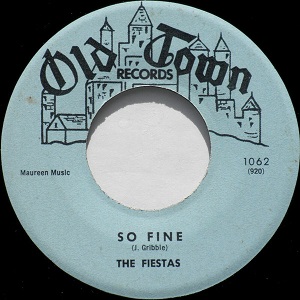
"So Fine" is a song written by Johnny Otis and performed by The Fiestas. It reached No. 3 on the U.S. R&B chart and No. 11 on the U.S. pop chart in 1959.

"Him or Me – What's It Gonna Be?" is a song written by Mark Lindsay and Terry Melcher, recorded by American rock band Paul Revere & the Raiders for their seventh studio album Revolution! It can be distinguished from other previous Raiders garage rock hits like "Kicks" and "Hungry" because of its more pop-flavored sound.
















